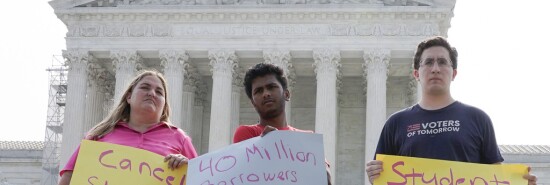
Did Biden plan for the Supreme Court to invalidate his illegal student loan forgiveness after the midterm elections?
Tiana Lowe Doescher
Video Embed
Maybe President Joe Biden was just being clever.
Biden’s proposal to cancel half a trillion dollars of student loan debt owed to Uncle Sam (the most expensive executive order in history) succeeded in helping secure the Democratic control of the Senate in the midterm elections, when college-educated voters decisively turned out to support the president’s party. Alas (for him, at first glance), the Supreme Court closed out its term by overturning Biden’s handout, ruling that existing law merely “allows the [education] Secretary to ‘waive or modify’ existing statutory or regulatory provisions applicable to financial assistance programs under the Education Act, not to rewrite that statute from the ground up.”
SOCIAL SECURITY UPDATE: DIRECT PAYMENT WORTH $914 TO ARRIVE FRIDAY
“The Secretary’s plan has ‘modified’ the cited provisions [of student loan forgiveness] only in the same sense that ‘the French Revolution ‘modified’ the status of the French nobility — it has abolished them and supplanted them with a new regime entirely,” Chief Justice John Roberts said, writing for the majority. “Congress opted to make debt forgiveness available only in a few particular exigent circumstances; the power to modify does not permit the Secretary to ‘convert that approach into its opposite’ by creating a new program affecting 43 million Americans and $430 billion in federal debt.”
The legal argument was predictable enough, leading a cynic to suspect that Biden proposed an illegal scheme solely to help Democrats over the finish line of the midterm elections. And given the economic consequences, it would be for good reason that the scheme’s inevitable invalidity was always a part of the plan.
Even against a candidate as weak as former President Donald Trump, the front-runner for the Republican presidential nomination, Biden risks a very real chance of losing reelection if the economy does not turn around. While unemployment is low and the markets are surprisingly resilient, economic growth is weak, and inflation continues to hammer the real wages of ordinary workers. As a basic principle, all forms of tax forgiveness and reduction are inflationary, while fiscal and monetary tightening are deflationary. But not all forms of tax relief result in the same consequences, and student loan forgiveness is uniquely perilous for the economic moment.
For starters, student loans are disproportionately held by the high earners and high spenders who are fueling price-level increases, rendering forgiveness not just inflationary but also regressive. The Committee for a Responsible Federal Budget found that nearly two-thirds of the relief resulting from both the debt forgiveness plan and the Biden administration’s pause on repayments would go to the top half of all earners.
Because former President Barack Obama federalized the student loan system, in practice, this would mean that average taxpayers, including those who will get their Social Security benefits slashed by 20% in a decade, are footing the bill for wealthier and higher-income taxpayers. (And yes, it benefits the wealthier, considering that the top quintile of wealth holds the majority of the nation’s student debt — as noted here by socialist Matt Bruenig, of all people.)
If the Supreme Court actually allowed Biden to see his plan into fruition, we would see a similar (but obviously more scaled-back) glut of spending as we saw after the government flushed the nation with checks in proximate response to the recent pandemic. For the price of a minor, privileged portion of society being freed from debt knowingly taken on, the rest of the country would pay the price in the form of persistent and increased inflation. Biden knows he couldn’t win reelection that way.
The Supreme Court did him a favor, and I suspect the White House knows it.
